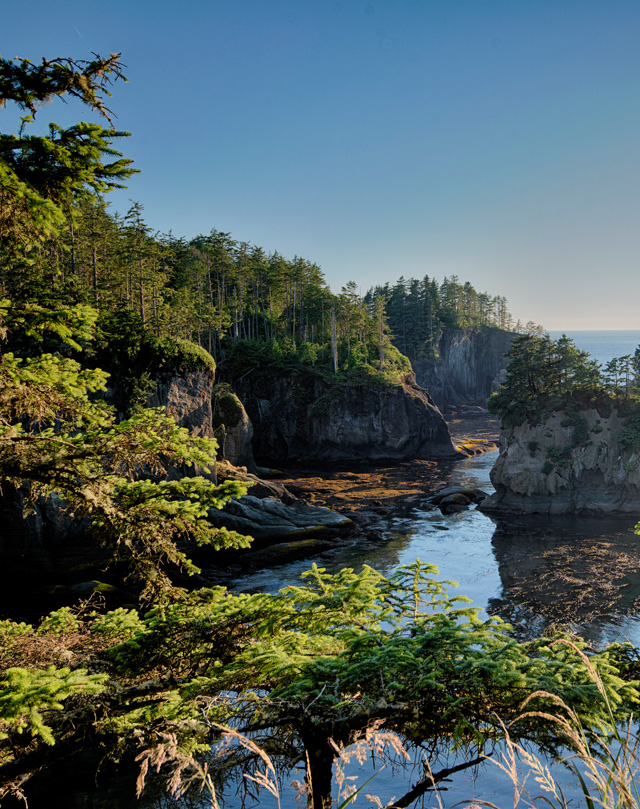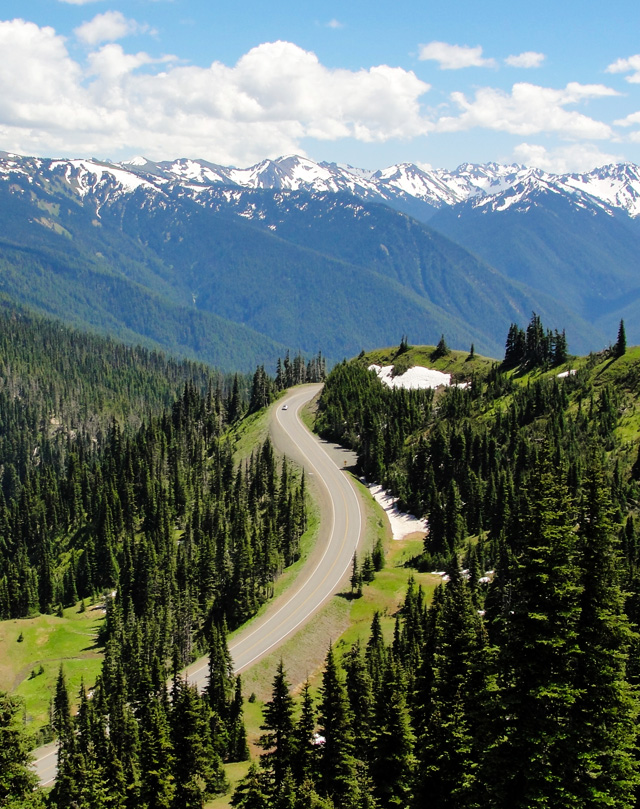The rectangular peninsula is more than just trees and shore. Historical Port Townsend has a preserved military base with killer views and a Victorian downtown embellished with art galleries. In industrial Port Angeles, ships come from faraway ports, making their first stops on the continent in a harbor hugged by the delicate sand spit of Ediz Hook.
Past the sparkling waters of Lake Crescent is an area that survived the Twilight boom. Anglers and loggers share their modest little town of Forks with vampire fans and werewolf groupies. And just off the main roads, each separated by pristine, wild beaches, the Native American reservations of the Makah, Quileute, Hoh, Quinault tribes marry ancient tradition with modern economies.
At the tip of the Olympic Peninsula sits Cape Flattery, the very corner of the country and the most northwestern point of the contiguous United States. Stand above the craggy cliffs, where the brutal waves of the Pacific roll in endlessly from the mist.

At the tip of the Olympic Peninsula sits Cape Flattery, the very corner of the country and the most northwestern point of the contiguous United States. Photo © John Fowler, licensed Creative Commons Attribution.
A temperate rain forest and herds of elk are even farther south, as is the gritty hometown of grunge legend Kurt Cobain, where he wrote songs under a grotty bridge. Take your time on the peninsula’s large loop, and don’t forget to stop for the hot springs, the majestic old hotels, and—if you see him—Bigfoot.
The Black Ball Ferry Line ($17 adults, $8.50 children 5-11, children 4 and under free, $60.50 for car and driver, $11 reservation fee) departs Victoria Harbor 2-4 times daily. (Ferry reservations are available online.) The 90-minute cruise crosses the Strait of Juan de Fuca arriving in Port Angeles.
After taking the ferry to Port Angeles, follow U.S. 101 west for 56 miles. This is the road that traces three sides of the Olympic Peninsula—west, north, and east—in an upside-down U. Speeds slow as the road hugs the south shore of Lake Crescent, so take care through the tight turns.
One big thing stands between the urban bustle of Seattle and the Olympic Peninsula—Puget Sound. Cross it by ferry at Edmonds, about 15 miles north of downtown Seattle. Take I-5 north to exit 177, following State Route 104 and signs for the Kingston ferry. Check departure times for the Washington State Ferries (888/808-7977, $7.70 adults, $6.20 children 6-18, children 5 and under free, $16.40 for car and driver). Plan to arrive a half-hour or even a full hour early—long lines lead to lengthy waits, especially on summer weekends.
After the 30-minute crossing, continue west on State Route 104 across the Hood Canal bridge, and then turn right on State Route 19 through Beaver Valley. The road merges into State Route 20 right before reaching Port Townsend.
The drive from Port Townsend to Port Angeles takes about an hour. From Port Townsend, follow State Route 20 south for 13 miles to the base of Discovery Bay. At the junction with U.S. 101, turn right and follow U.S. 101 west for 33 miles.
Did you take a wrong turn and end up in bucolic New England? No, but it sure feels like it in Port Gamble, where meticulously trimmed lawns and blinding-white picket fences evoke the cleanest town in Maine—on purpose. The founders of the Puget Mill Company, a timber outfit, wanted to re-create their birthplace from back East on this turn of Highway 104 on the tip of the Kitsap Peninsula. The town was founded in 1853 and is accordingly Victorian in style.
Although the sawmill has closed, the town is a national historic landmark and home to almost 1,000 people. An annual ghost-hunting conference is held in October, all the better to explore the spirits haunting the old buildings. Year-round, more corporeal visitors can explore the exterior of St. Paul’s Church (31899 State Route 104, 360/297-8074) from 1879, fronted by a gray-and-white steeple and stained-glass windows. It copies a house of worship in East Machias, Maine.
Among the antique shops and day spa are several craft-oriented stores, including The Artful Ewe (32180 Rainier Ave. NE, 360/643-0183, 10am-5pm, Fri.-Sun.), a warm yarn shop stocked with soft skeins of wool. The proprietor is often spinning or winding yarn in the corner on a large wooden wheel.
In the back of the Port Gamble General Store (32400 Rainier Ave. NE, 360/297-7636, 9am-3pm Mon.-Wed., 9am-8:30pm Thurs., 8am-8:30pm Fri.-Sat., 8am-4pm Sun.) is a café open for breakfast and lunch. Instead of biscuits, they pour sausage or mushroom gravy over Native American fry bread, and weekend specialties include lemon ricotta pancakes. Lunch dishes source from Beecher’s Cheese in Seattle and other local purveyors.
From Astoria, follow U.S. 101 north through rural southeastern Washington, passing the east side of Willapa Bay. U.S. 101 reaches the industrial towns of Aberdeen and Hoquiam in about 77 miles, and then passes through forest, an Indian reservation, and part of the Olympic National Park before reaching Forks in 100 miles (or about two hours). The total drive will take a little less than four hours, most of it on narrow two-lane highways.

U.S. 101 passes through forest, a reservation, and part of the Olympic National Park. Photo © Miguel Vieira, licensed Creative Commons Attribution.